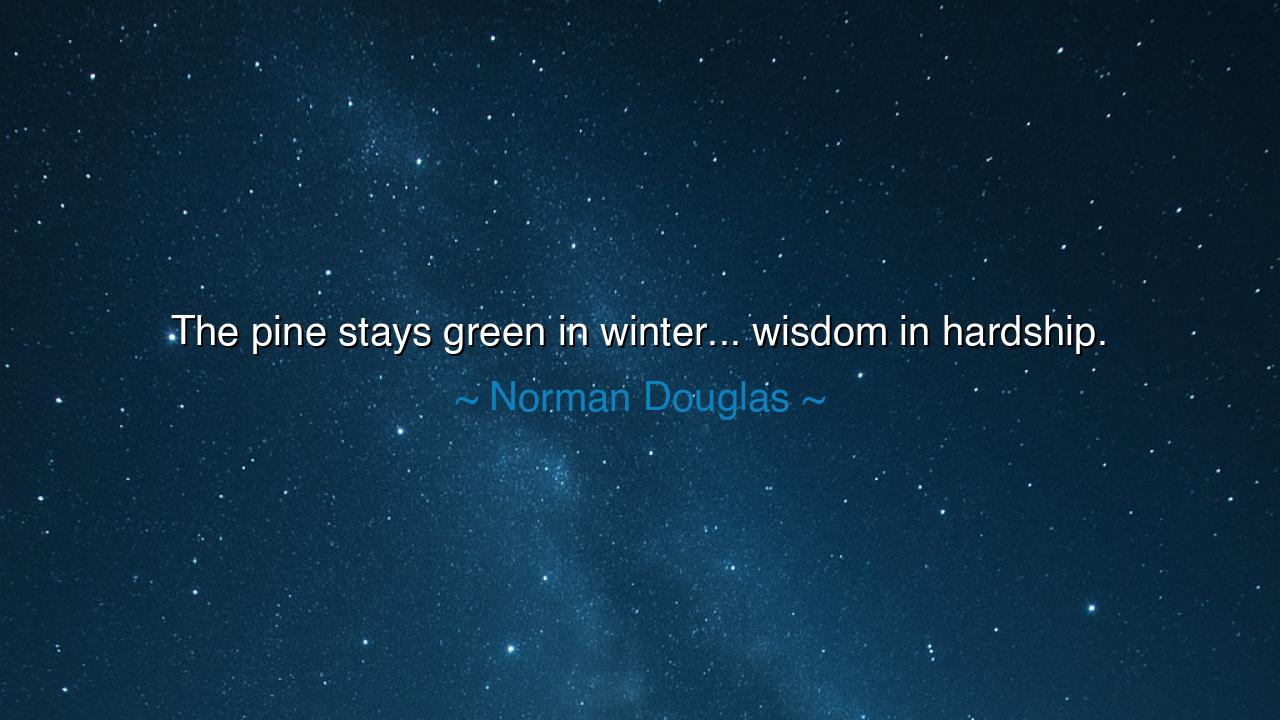
The pine stays green in winter... wisdom in hardship.






Norman Douglas, with the poet’s eye for nature’s symbols, declares: “The pine stays green in winter… wisdom in hardship.” In these few words he binds together the endurance of the tree and the endurance of the soul. When frost covers the earth, when branches of lesser trees lie bare, the pine still holds its color, its strength, its life. So too does wisdom shine most clearly not in times of ease, but in the chill of trial. For it is in hardship that the true spirit is tested, and only that which is rooted deep survives.
The ancients often looked to nature as their teacher. The Stoics, in their pursuit of endurance, taught that a man should be like the rock against which the waves break, unmoved by the storm. But Douglas offers a gentler, living image: not the lifeless rock, but the ever-green pine, steadfast through the cold. To endure with wisdom is not merely to resist, but to remain alive, fruitful, and whole even when the world seems barren.
History gives us noble examples. Nelson Mandela, cast into the prison of Robben Island for decades, faced a winter of injustice. Yet his spirit did not wither; he kept his wisdom green, meditating, studying, and preparing. When at last the winter ended, he emerged not broken but towering, ready to guide his people into spring. Like the pine, he remained steadfast, and through endurance found greatness.
We see the same truth in the Scriptures. The psalmist speaks of the righteous man as a tree planted by rivers of water, whose leaf does not wither. Even in seasons of drought or winter, he endures, because his roots sink deep. Douglas’s words are kin to this ancient vision: hardship comes to all, but those who hold fast to wisdom remain green when others fall barren.
Let the generations remember: adversity is the winter of the soul, but it is also the proving ground of greatness. To be evergreen is to let wisdom guide you when all else falters, to remain steadfast when storms rage and the world grows cold. For in every winter lies the chance to show the strength of one’s roots. And he who endures, like the pine, will stand tall until the return of spring, a living testament that wisdom in hardship is the soul’s most enduring beauty.






DT39_ Doan Trang_B2
I find this quote comforting because it reminds me that stability itself is a form of wisdom. In life, winters are inevitable—loss, failure, uncertainty—but the pine’s endurance shows that it’s possible to remain grounded. I’d like to know whether Douglas saw this as spiritual wisdom or simply a reflection of nature’s quiet teachings. Either way, it feels like an invitation to stay rooted when life feels cold.
THNguyen Thi Thu Hien
There’s something timeless about this metaphor. The pine represents a kind of quiet strength that doesn’t demand attention but commands respect. It makes me think about how we define wisdom today—often as cleverness or knowledge—but maybe it’s more about perseverance and grace under pressure. Can we learn to value subtle, enduring strength over flashy achievement in a culture obsessed with immediacy?
BTLe Thi Bich Thao
This quote feels meditative to me, almost like a quiet reminder of patience. It suggests that constancy, not brilliance, is the mark of true wisdom. But I also wonder if there’s a danger in idealizing endurance. Should wisdom always mean staying strong, or can it also mean knowing when to let go or change? Sometimes growth requires shedding old leaves, not just holding firm through the cold.
TTTran Tien
I love the natural imagery here—it connects survival with grace. The pine doesn’t just endure winter; it remains vibrant through it. That makes me reflect on how people carry themselves during adversity. Can we stay true to our values and sense of self when everything around us feels barren? Perhaps wisdom isn’t about avoiding hardship, but learning how to remain alive in spirit despite it.
DTDao Truc
This quote feels beautifully simple but incredibly profound. It makes me think about resilience—the idea that real wisdom isn’t proven in good times, but in how we endure the cold seasons of life. I wonder, though, does hardship automatically lead to wisdom, or does it depend on how we respond to it? Maybe the pine’s ‘green’ symbolizes hope that comes from inner steadiness rather than circumstance.